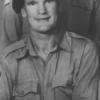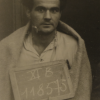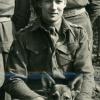Johnny was tall and inclined to be heavily built (not an advantage for parachuting); he had eyes that twinkled behind heavy lids, but they could, at times, flash with impatience if not anger. He grew a rather untidy moustache which he had a habit of pulling and twisting – a habit which helped to keep it rather untidy. He was a dreamer of battles to be fought and to be won; there was no such thing as defeat in his dreams which became reality.
Johnny Frost had a mystical magic - no need for him to write high sounding messages to his junior commanders or to address the men whom he led with words of inspiration - here was the man himself – the very epitome of inspiration – such was the aura which surrounded him. He was sentimental, sometimes ruthless when he had to be, sometimes aloof, but always calm. I shall never know if he knew fear, but if he did, I never saw it. He chuckled rather than laughed and he chuckled easily and frequently. Johnny was a modest man, almost shy in matters which concerned himself personally. On the other hand he was frequently outspoken to officers senior to himself when he disagreed with a proposed plan of action – and he did so with authority and a conviction that was almost divine! Fate had set the course for this man who was eventually to command the men on ‘the Bridge’ at Arnhem and every action which the 2nd Battalion fought during the war.
After the war I had a great desire to paint a portrait of this man who is a legend to legions and with whom I was privileged to serve, and so I did. The painting shows the bridge at Arnhem, the emblem of this greatest of many battles. From a clear September sky in 1944 the 2nd Battalion of The Parachute Regiment fought its way to the bridge and in subsequent engagements held that vital artery until the sky was obscured by a canopy of smoke. The portrait of Major General John Frost CB DSO MC, painted in 1978, depicts him defiant against the bridge, implacably calm, as he always was. His famous hunting horn is missing: it was taken from him after the battle, but his shooting stick symbolises his nonchalance and his belief that a commander should never become involved with a personal weapon – his task was to command and win the battle, and not get himself into a position of personal combat. The strong light at his feet exemplifies his unshakeable determination to hold ground which his battalion occupied and neither smoke nor rubble, nor the enemy, ever changed his poise or purpose.
Reproduced from The Silken Canopy by Major Victor Dover MC (ISBN 0304302384)
Read More




Latest Comments
There are currently no comments for this content.
Add Comment
In order to add comments you must be registered with ParaData.
If you are currently a ParaData member please login.
If you are not currently a ParaData member but wish to get involved please register.